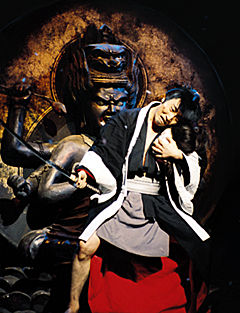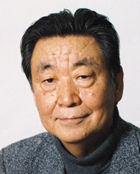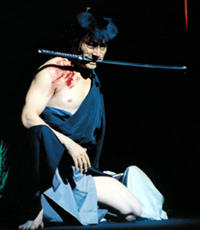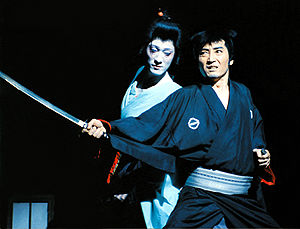AUTO | KOI | MAC | DOS | WIN | LAT

The Seinandza Theatre
|
| "Upon My Life I Swear My Love For Sango" |
Namboku Tzuruia |
|
Namboku Tzuruia (1755-1829) wrote plays for the Kabuki Theatre in the early 19th century. He was born in Edo (now Tokyo), and his activity as a playwright coincided with the reign of the Bunka-Bunsei dynasty. Tzuruia is regarded as a great Japanese playwright, and his work has greatly influenced both the Kabuki theatre and the development of Japanese drama as a whole. The play had originally opened in 1825, when it was considered that it was a 'horror-inspiring play'. As a result, it was removed from the repertoire of the Kabuki and for a long time disappeared from the stage. The key theme of the play is a conflict between love and fidelity on the one hand, and betrayal and power of money on the other. The moral issues on which the play dwells are as vital today - in Japan or elsewhere in the modern world - as they were in the past. The worship of the golden calf and its eventual triumph over personality has remained a recurrent and meaningful motif throughout the history of mankind. |

|

| Sudzi Ishidzawa, the director, was born in Tokyo in 1930. He graduated from the drama studies department of Tokyo University. In 1964 he did a training course under Jean-Loius Barrault. He was the Chief Editor and publisher of the magazine Singaki (New Theatre) and one of the founders of the drama department at Toho Gakuen University. At present he heads the literary department of the Seinandza Theatre. In addition, Sudzi Ishidzawa is Chairman of the Japanese Centre of the International Association of Theatre Critics, and Vice-President of the Japanese Association of Artistic Directors. Among Ishidzawa's principal productions are Thoughts of Siaraku and Yaya by Seyiti Yashiro, Upon My Life I Swear My Life for Sango by Namboku Tzuruia, Karasiuki-san by Kan Miyamoto, The Bald Singer by Ionesco and Brecht's The Beggar's Opera. Ishidzawa is a holder of numerous Japanese awards. |
 The Seinandza was formed in May 1954. The founders proclaimed that the aim of the new theatre was producing original plays. Initially, their repertoire did not feature any foreign playwrights or recognized masters of national drama, most plays being by the Japanese authors of the post-war generation - Rindzo Siina, Yukyo Mishima, Kobo Abe - and by some younger playwrights. Little by little the repertoire expanded to include pieces by modern Japanese classics and foreign authors, as well as some musicals. The Seinandza is a notable 'component' of Japan's theatrical life. Its merits have been recognized and rewarded by numerous prizes and awards. The theatre has a drama school attached to it, which has trained a great number of talented actors.
The Seinandza was formed in May 1954. The founders proclaimed that the aim of the new theatre was producing original plays. Initially, their repertoire did not feature any foreign playwrights or recognized masters of national drama, most plays being by the Japanese authors of the post-war generation - Rindzo Siina, Yukyo Mishima, Kobo Abe - and by some younger playwrights. Little by little the repertoire expanded to include pieces by modern Japanese classics and foreign authors, as well as some musicals. The Seinandza is a notable 'component' of Japan's theatrical life. Its merits have been recognized and rewarded by numerous prizes and awards. The theatre has a drama school attached to it, which has trained a great number of talented actors. |
|
Moscow Chekhov Art Theatre 25, 26, 27 April Kamergersky Lane, 3 |

|
Platonov | Festival Homepage | A Girl With Matches
Write us: chekhov_fest@theatre.ru
